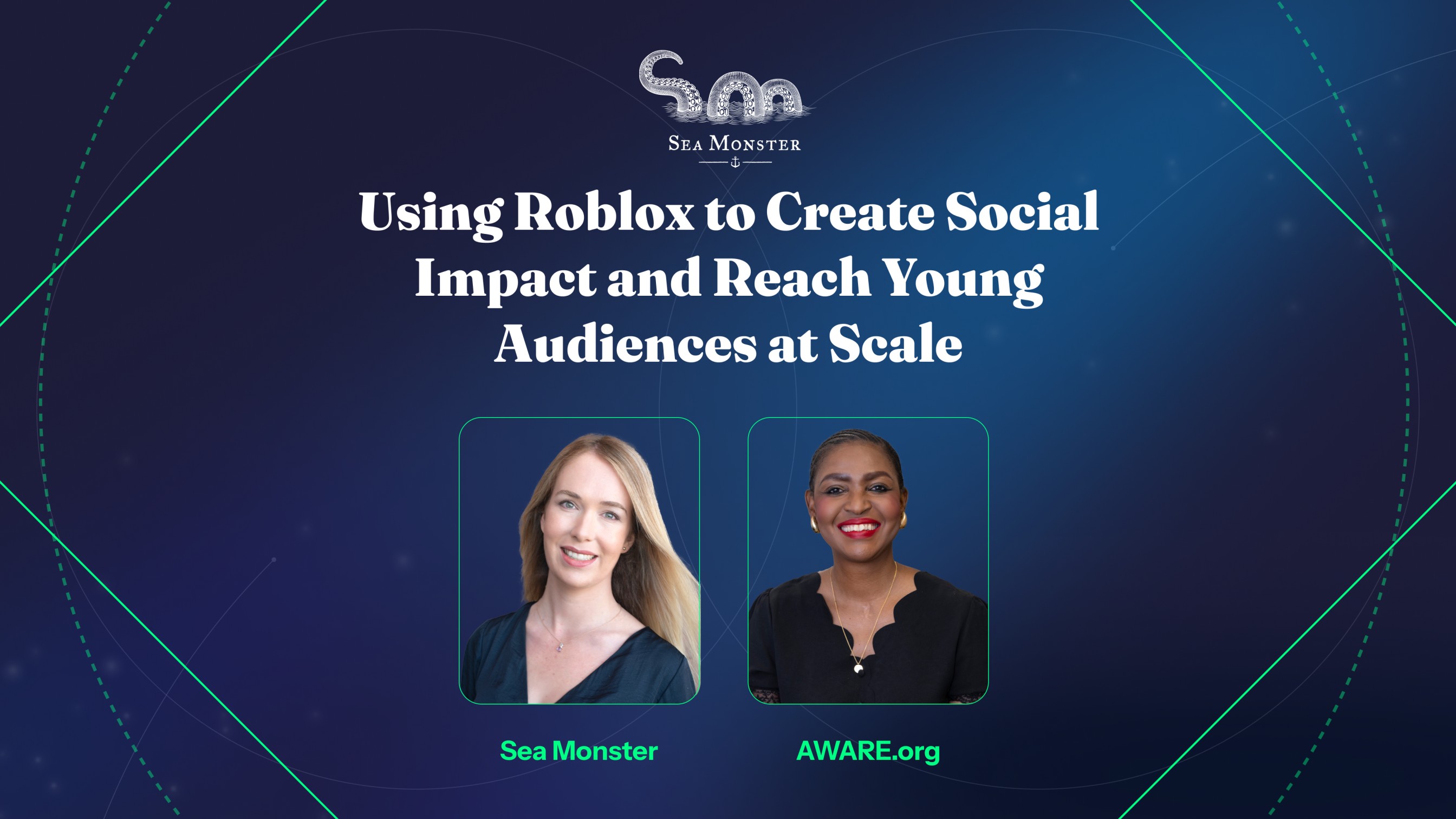Young people will spend hours learning financial literacy on TikTok. They'll ignore a bank's youth campaign in seconds. The difference? One feels relevant. The other feels like homework. Traditional financial education is failing not because youth don't care about money, but because banks haven't figured out how young people actually want to learn. So how might financial services brands close this gap?
The answer lies in meeting them on their terms, in spaces where they're already spending their time - in online virtual worlds like Roblox.
With 380 million monthly active users globally and over 85 million daily active users, Roblox is so much more than just a gaming platform, it's a parallel world where young people are spending hours every day engaging with their favourite games, their favourite brands and with each other in real time. It’s a space where young people are socialising, having fun and also learning real-world skills through play. And it's where forward-thinking brands from every industry are establishing their digital presence to connect with Gen Z and Gen Alpha.
For financial services, several international brands have cracked the code, creating Roblox experiences that educate about money management, investing, and entrepreneurship in ways that feel engaging rather than preachy. We’ve compiled some examples of what's working, and why it matters.
Pancake Empire Tower Tycoon by Fidelity Investments
In a world where 68% of parents worry about their children's financial future, Fidelity Investments decided to flip the script on traditional financial education. Instead of another boring brochure or classroom presentation, they created Pancake Empire Tower Tycoon - a delightfully absurd game where financial literacy meets breakfast food entrepreneurship. Players start by buying pancakes that produce "YumYums," which become the game's currency. To grow their earnings, users must choose between three friendly creatures to deposit their YumYums with, each offering different return rates that mirror real-world investment risk levels - from safe to risky. Players then face the classic financial dilemma: spend their earnings on tower upgrades and fancy pancake flavors, or save for the next round to maximise their returns.
Key Results: Since its launch in April 2023, Pancake Empire Tower Tycoon has become a standout success in Fidelity's digital education arsenal. The experience has drawn millions of visits and maintains consistently high engagement rates, with players spending significant time navigating the obstacle courses and building their pancake empires. The game's success has been so notable that Fidelity expanded it with "Waffle Stack Attack," a major update featuring new gameplay elements and UGC (User Generated Content) rewards.

Chow Town by Nedbank
South African banking giant Nedbank took a uniquely local approach to financial education with Chow Town, a restaurant management game that celebrates South African cuisine while teaching business fundamentals. Players must set up and run virtual restaurants featuring local dishes, making decisions about menus, stock ordering, meal preparation, and sales - all while learning crucial business skills and money management. Built by Sea Monster, the game combines cultural pride with practical education, allowing kids to cook boerewors, pap, and other South African favourites while mastering the art of profit and loss. Players can visit each other's restaurants, collaborate with friends, and earn tokens that teach them about spending, saving, and investment decisions.
Key Results: Chow Town has become the most successful Roblox game developed and launched in South Africa. Within five months of its March 2023 launch, the game attracted its first 100 000 local users, and generated an impressive 87% approval rating on Roblox. After several phases of updates since its initial launch, including adding the ability to hire staff (a request from the users), Chow Town has evolved into an integral part of Nedbank's digital youth engagement strategy, and continues to provide value by serving as a bridge between Nedbank and a vibrant community of South African youth.
.png)
ING City by ING Bank Poland
ING Bank Poland recognised that traditional banking branches couldn't compete with digital natives, so they brought the branch to where teens actually spend their time - by creating an entire virtual city in Roblox. ING City offers players their first taste of financial responsibility through engaging tasks like working delivery services, cleaning the city, and walking dogs to earn Robux. The experience goes beyond simple task completion, allowing players to make real financial decisions with their earned currency - whether to spend it on character customisation or save up for bigger purchases like virtual apartments. This mirrors real-world financial decision-making in a consequence-free environment where learning happens through play rather than lectures.
Key Results: ING City has successfully engaged Polish teens and expanded beyond the virtual world. The bank complemented the Roblox experience with a special series of real-world debit cards featuring popular Polish gaming influencers including Farrell, Dejdejka, Yoshi, Cebulsonn, and Miss Aga, creating a seamless bridge between virtual financial education and real-world banking relationships.

BONUS: Fortune Island by e.l.f. Beauty: Earn. Learn. Flex.
While not a traditional financial services brand, beauty company e.l.f. Beauty recently created one of the most innovative financial literacy games on Roblox, demonstrating how non-financial brands can effectively teach money skills. Fortune Island: Earn. Learn. Flex. was developed in partnership with fintech company Chime to address the fact that Gen Z would rather talk about literally anything than money or debt. The game transforms financial education into a social story experience, guiding players through four unique life stages with real-world scenarios that teach saving, budgeting, investment protection, and purposeful investing. By gamifying these traditionally dry topics, e.l.f. created an experience that feels more like entertainment than education.
Key Results: Fortune Island has achieved phenomenal success, reaching over 1.7 million plays and demonstrating that financial literacy content can be both educational and genuinely engaging. The game's success contributed to e.l.f.'s broader Roblox presence, with their main experience e.l.f. UP!.

The future is virtual, the opportunity is real
For financial services brands, virtual worlds like Roblox offer unprecedented access to their future customers during their formative years, when money habits and brand loyalties are still being shaped. Rather than waiting until these digital natives reach the ‘traditional banking age’, forward-thinking institutions are building relationships now.
These examples aren't just cute marketing experiments, they represent a fundamental shift in how financial education happens in 2025. Traditional approaches assume young people need to be convinced to care about money. These experiences prove that young people already care deeply about economic success; they just prefer learning through experience rather than instruction. As traditional marketing channels become increasingly ineffective with younger audiences, virtual worlds like Roblox represent not just an opportunity, but a necessity for financial services brands serious about building long-term relationships with the customers and employees of tomorrow.
Ready to explore how your brand can show up in Roblox? Visit Sea Monster's Roblox page to learn more about creating impactful experiences that could help you educate, engage, and inspire the next generation of financial decision-makers.


.svg)
.svg)






.gif)
